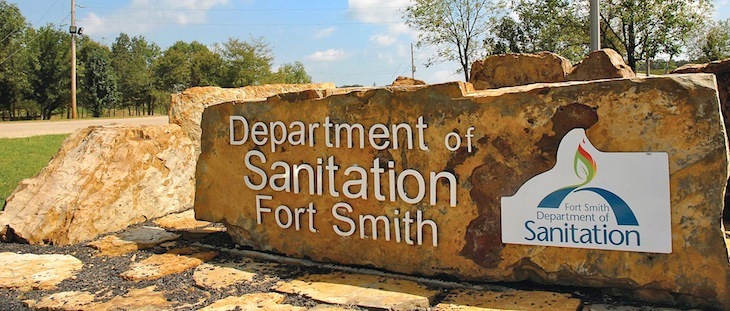Fort Smith costs to dispose of recycling at landfill continue to climb, new estimate above $680,000
by May 9, 2017 5:09 pm 1,959 views

The cost to run recycling routes in Fort Smith during the 10-months – and counting – that recyclables have been going to the landfill is significantly higher than an initial estimate the city provided Talk Business & Politics.
On Tuesday (May 9), the Fort Smith Sanitation Department made significant adjustments to initial numbers city administration provided to Talk Business & Politics regarding the cost of running recycling routes without recycling, more than tripling the initial figure of $182,000 to something closer to $684,636 during a 10-month period.
City leaders have also decided to continue to run recycling routes as they work to find short-term and long-term solutions to the issue of not having a recycling center that will take its materials.
Sanitation Director Mark Schlievert said in a phone interview with Talk Business & Politics “the best we’ve been able to tell using the FEMA schedule is a total monthly cost of $52,920 to run all seven routes.”
Extrapolating the figure over the 10 months from June 27, 2016 – the date after which the city started taking recycling to the landfill – to April 27, 2017, equals a cost of $529,200, “not counting labor,” Schlievert said. Schlievert referred Talk Business & Politics to the city’s Human Resources department for labor costs.
An HR department official said there was not a position specifically designated for recycling, but the job responsibility would fall to the “Equipment Operator II” position, which carries with it starting pay of $12.91 per hour excluding benefits, or $516.40 per 40-hour week. The sanitation department employs 14 employees to its seven recycling trucks, equaling an estimated $7,229.60 per week.
Schlievert said recycling routes also pick up yard waste, but could not give a percentage breakdown when asked of how much time is spent on yard waste and how much on recycling. Assuming recycling work is 50%, the estimated labor costs would be $3,614.80 per week times 43 weeks for a full 10-month period. This comes out to an additional $155,436.40 on top of the $529,200, or $684,636.40 altogether. (This assumption of 50% was made by Talk Business & Politics, although sources have said the recycling time is likely higher than 50%.) If the labor time on recycling is more than 50%, the city’s cost could climb closer to $1 million.
Regarding the benefits cost, HR said it would need more time to compile, but is in the process of doing so. Talk Business & Politics will update as those figures become available.
As with the $182,000 Talk Business & Politics initially reported, the numbers presented above are estimates based on information provided by city officials, therefore subject to change as the city continues to configure a final way of compiling actual costs. The original number was arrived at by taking Deputy City Administrator Jeff Dingman’s email citing a monthly expense of $2,600 per route times seven routes over the same 10-month period. Talk Business & Politics asked Dingman on Tuesday where his numbers had originated and was told they came from the sanitation department. When asked about the numbers, Schlievert said the numbers had not come from him.
Dingman also said on Tuesday the city is hoping for a solution soon that will allow it to once again process recyclables through a recycling center rather than continuing to dispose of the materials at the landfill. MARCK Industries and Smurfit KAPPA are the two companies being considered.
Previously the city had been allowed to transfer recyclables to Green Source Recycling Center in Clarksville, Ark., at no cost beyond the cost to transport. Green Source Director Justin Sparrow said the center decided to stop taking Fort Smith’s materials because it did not have the capacity to process materials due to the manner in which it was received, while also serving its nine-county district. The center opted instead to take “higher quality materials” from neighboring Russellville, Ark., Sparrow said.
On May 1, the city noted in a press release recyclables had been landfilled from November 2016-Present. Talk Business & Politics later discovered the actual time had been 10 months – with landfilling beginning in late June.
